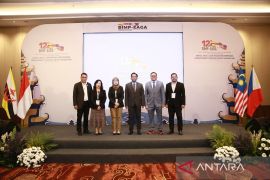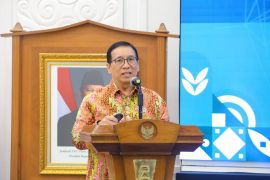One of the efforts to reduce unemployment was creating more jobs by building new plants, implementing infrastructure projects and boosting the trade and service sectors, the President said.Jakarta (ANTARA News) - The issue of jobless people drew the attention of the Indonesian government this year, despite a drop in the country`s unemployment rate.
Realizing that a high unemployment rate would burden the economy, President Susilo Bambang Yudhoyono called a limited cabinet meeting early in December to discuss efforts to create more jobs for millions of people in the labor force.
One of the efforts to reduce unemployment was creating more jobs by building new plants, implementing infrastructure projects and boosting the trade and service sectors, the President said at the meeting.
The meeting culminated in the establishment of a job creation desk, with Coordinating Minister for Economic Affairs Hatta Rajasa as its chairman. The desk will be tasked with tackling unemployment and providing incentives for companies to draw from the country`s vast labor pool.
With the formation of the desk, the government aims to double the number of new jobs to one million every year from the current 500 thousand, hoping it will lower the unemployment rate to 5 percent in 2014, from the current 6.1 percent.
The government is preparing a number of policies to create one million jobs per year by providing the business world with easy access to capital, giving the industrial sector tax incentives, and setting up job training centers next year, Hatta said, following a coordination meeting in the middle of this month on efforts to speed up job creation.
The other key to lowering unemployment is maintaining the current momentum of economic growth. Indonesia is among the few nations in the world that saw robust growth in the past two years, despite the global economic slowdown.
Indonesia`s economy grew 6.5 percent last year on strong household consumption and investment. The growth is projected to fall to 6.3 percent this year due to the decreased contribution of exports. The World Bank has predicted that the Indonesian economy will expand 6.3 percent next year, driven by high domestic consumption.
Minister for National Development Planning and Head of the National Development Planning Board (Bappenas) Armida Salsiah Alisjahbana said every 1 percent rise in economic growth would open 350,000 new jobs in the country.
According to the Central Statistics Agency (BPS), Indonesia`s unemployment rate in August 2012 fell to 6.14 percent from 6.56 percent in the same month last year. The country, with a population of approximately 240 million, had 7.24 million people in the labor force in August 2012, compared to 7.7 million in August 2011.
The August 2012 unemployment rate was also lower than the 6.32 percent seen in February this year, BPS Chief Suryamin said.
The number of job seekers in August 2012 rose by 670 thousand from August 2011. Meanwhile, the number of job seekers employed in August 2012 increased by 1.1 million, compared with the same period last year, he noted.
The agricultural, trade, public service and industrial sectors still play a major role in creating job opportunities in the world`s fourth most populous nation.
BPS noted that almost all sectors, except agriculture, trade, and transportation, warehousing and communication, recorded an increase in the number of people employed in August 2012, compared to the same month last year.
The number of job seekers employed in the agricultural sector fell 1.14 percent or 450,000, while those in the trade sector fell 1.07 percent or 250,000, and those in the transportation, warehousing and communication sector fell 1.57 percent or 80,000, the BPS chief said
The government has set itself the target of reducing the nation`s unemployment rate to 5.8-6.1 percent in 2013.
"The target is quite realistic, assuming that our economic growth is at 6.8 to 7.2 percent, where every 1 percent growth can lead to the creation of 350,000 jobs," Manpower and Transmigration Minister Muhaimin Iskandar said.
The minister added that there would be 2.5-2.7 million new recruits in 2013, which would reduce the number of unemployed people in the country to 7.2-7.4 million.
"We are glad that the European crisis has not affected the Indonesian economy yet. However, in anticipation of an indirect effect of the global economic downturn on the employment rate in Indonesia, the government has approached companies and persuaded them not to cut jobs," he said.
After all, the recent increase in provincial minimum wages may deal a blow to the creation of jobs. For instance, the provincial minimum wage in Jakarta for 2013 has been raised 44 percent to Rp2.2 million, from this year`s Rp1.5 million.
Although the new minimum wage was lower than the city remuneration board`s recommendation of Rp2.216 million and workers` proposal of Rp2.7 million, it sparked a protest from entrepreneurs who had earlier sought a minimum wage of Rp1.9 million.
The Industry Ministry proposed to the Finance Ministry that incentives, including tax allowances, be provided to labor-intensive industries such as footwear and textiles, in response to the increase in minimum wages.
"Creating job opportunities is the state task and providing incentives in the form of tax allowances to labor-intensive industries will have an impact on the continuation of their businesses," the ministry`s director general for manufacturing industry base Panggah Susanto said.
"The incentives will not reduce state revenues, but will benefit the business world and workers," he pointed out.
He feared that if the proposal was not approved, industries would relocate their plants to other countries which offered lower wages.
Labor-intensive industries are the government`s key industrial sector, he said, adding: "In the next 15 years, the labor-intensive industries will still need many workers. In developed nations, labor-intensive industries give great contributions to their industrial growth."
Acting chief of the fiscal policy board at the Finance Ministry Bambang Brodjonegoro gave the assurance that the government would provide tax incentives to labor-intensive industries next year, to prevent them from going bankrupt due to high production costs. (*)
Reporter: Suharto
Editor: Heru Purwanto
Copyright © ANTARA 2012











